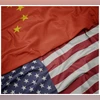Chinese chip companies targeted by Washington with fresh export controls have vowed to speed up supply chain localisation and said they would be able to continue production thanks to recent efforts to build equipment stockpiles.
The latest curbs, the third US crackdown on the Chinese sector in three years, focused on chipmaking equipment, software and high-bandwidth memory. They restrict exports to 140 companies, including chip equipment maker Naura Technology Group and ACM Research.
Empyrean, a maker of electronic design automation (EDA) tools also known as Beijing Huada Jiutian Technology, said its inclusion on the list would have little impact on operations.
"The company will seize the development opportunity to accelerate the localisation process of full-process EDA tools," it said in a stock market statement.
Jiangsu Nata Opto-Electronic Material, which manufactures materials used in chipmaking, told Chinese news outlet Yicai it had stocked up and would also make domestic substitutions, but did not provide specifics.
Others, such as semiconductor test systems provider Beijing Huafeng Test & Control Technology, said they had already fully localised their supply chain, the 21st Century Business Herald newspaper reported.
More From This Section
While Chinese authorities called the move "economic coercion", the measures appeared to have little impact on chip-making stocks, which rose slightly on Tuesday as analysts said the curbs were less stringent than feared. Manageable disruption
The US curbs target the "weakest spot" in the Chinese semiconductor industry, which relies heavily on foreign equipment for manufacturing, said Martijn Rasser, managing director at Datenna, a data intelligence platform focused on China's technology.
Capital expenditure by the Chinese chip industry next year will likely fall by $10 billion, or about 30 per cent year-on-year, to $35 billion, as a result of these curbs, Jefferies analysts said in a note.
But other analysts said the curbs may not have the desired effect as Chinese chip firms have since last year ramped up purchases of foreign made equipment from the likes of Dutch lithography machine maker ASML and US toolmaker Lam Research.
For the first nine months of this year, China's imports of semiconductor equipment increased by a third to $24.12 billion, according to data from China Customs.
"This was as close to the continuation of the status quo in terms of it's making things very difficult for manufacturers at the leading-edge but it's not going to disrupt that progress any more than the existing regulations," said Jeff Koch, an analyst at research group SemiAnalysis.
CXMT exclusion
The exclusion from the entity list of ChangXin Memory Technologies (CXMT), China's leading manufacturer of a key component in AI chips, surprised some.
The Biden administration says the restrictions are aimed at limiting China's ability to access and produce chips that advance AI for military applications or threaten US national security.
Shares of some South Korean equipment suppliers to CXMT firmed on Tuesday after its exclusion. CXMT did not immediately respond to a request for comment.
"The development has brought short-term relief to South Korea's chip sector, as their China-bound revenue is unlikely to be significantly affected for now," said Ryu Young-ho, an analyst at NH Investment & Securities.
Shares of Jusung Engineering, a CXMT supplier, were up 7.7 per cent in morning trading, after falling nearly 7 per cent the previous session amid concerns about the pending restrictions.
Mirae Corp, a South Korean chip equipment maker that derived about 15 per cent of its total revenue from CXMT in the first half of this year, signed about 9 billion won ($6.41 million) worth of supply deals with CXMT this year so far. Its shares rose 1.4 per cent in morning trade, extending gains of 7 per cent in the previous session.
(Only the headline and picture of this report may have been reworked by the Business Standard staff; the rest of the content is auto-generated from a syndicated feed.)
)